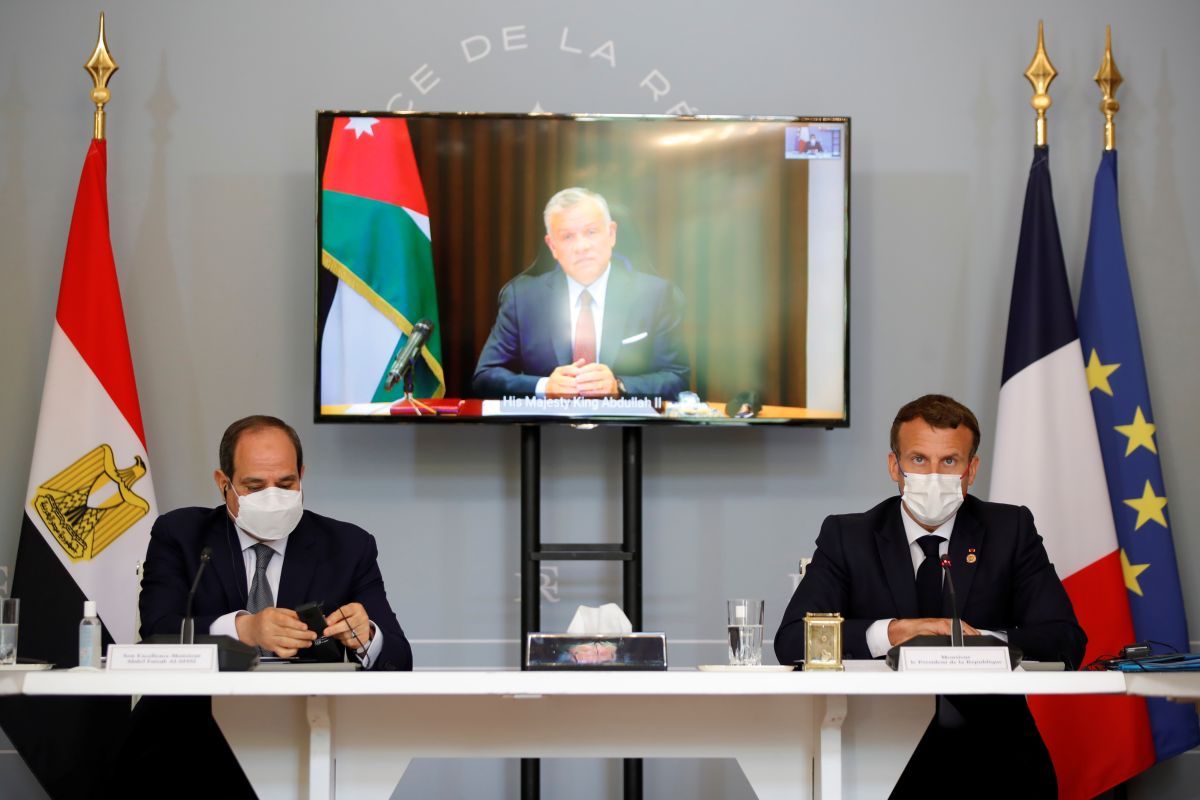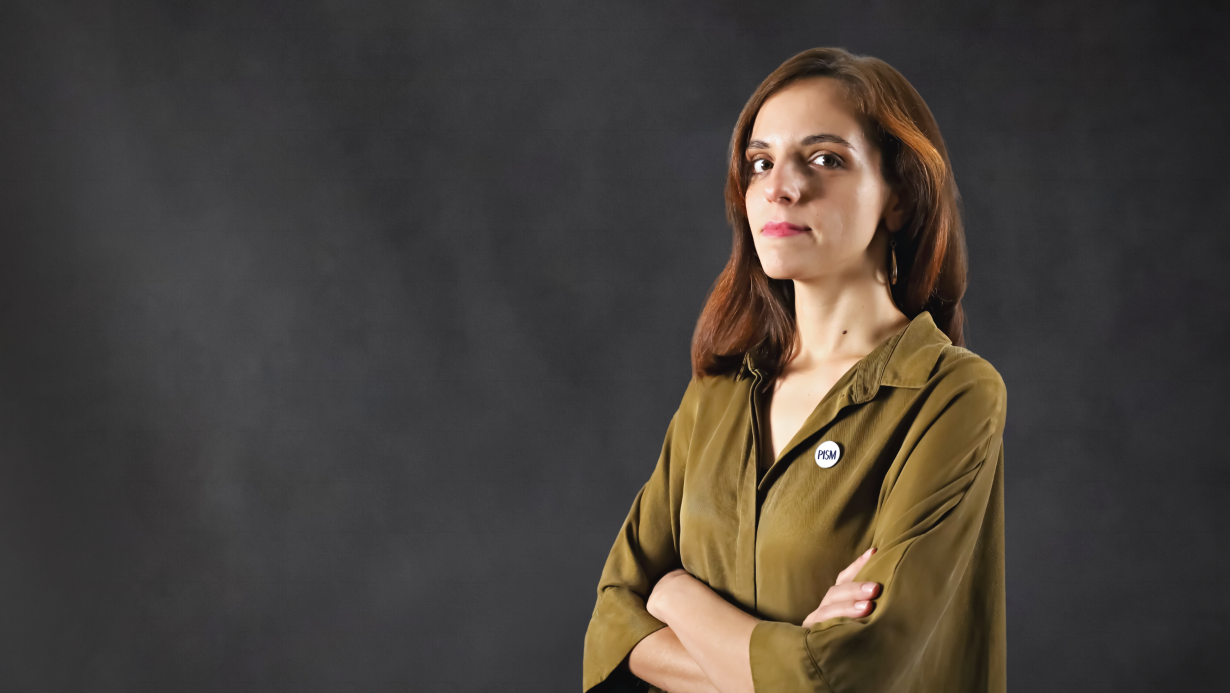New Arab Authoritarianism as a Challenge for the EU
In June, France announced investments in Egypt worth €3.8 billion. This agreement is part of a wider intensification of cooperation between some European states and Arab countries led by autocrats. It is linked to the growing belief that only a secular dictatorship can prevent further destabilisation of the Middle East and North Africa. This contributes, however, to the strengthening of authoritarianism in the region, which exacerbates the situation and threatens the EU’s effectiveness at democratisation.
 Photo: Sarah Meyssonnier/Reuters
Photo: Sarah Meyssonnier/Reuters
During his visit to Cairo, French Minister of Finance Bruno La Maire signed agreements on development aid and investments by French companies in Egypt. This country is an increasingly important French partner in the Middle East and North Africa, as evidenced by the 18% increase in French investments in Egypt in fiscal year 2019/2020 compared to the previous year. Over the last decade, the importance of cooperation between some EU countries and the monarchs of the United Arab Emirates (UAE) and Saudi Arabia has also increased. Both countries are leading buyers from the French arms industry and have strengthened economic and military cooperation with Greece and Cyprus. Egypt is also a significant importer of European weapons in general (third-largest recipient of German exports in 2019). In November 2020, France, Greece, Cyprus, and the UAE participated in military exercises organised by Egypt, and in April 2021, Greece signed an agreement with Saudi Arabia to lease it a Patriot air defence system. Moreover, Cyprus and Greece are striving to normalise relations with the Syrian regime (in June this year, Greece reopened its embassy in Damascus), which is in line with the policy of the Persian Gulf states.
New Authoritarianism
Arab leaders began to intensively promote the idea that the authoritarian model of government is the best for the Middle East countries after the mass protests of 2011, presenting their actions as a way to achieve the democratic aspirations of their people. The Arab Spring proved that the push for democracy came with the growing popularity of Islamist parties, such as those linked to the Muslim Brotherhood (MB), which pose a threat to dictators in Egypt and the Persian Gulf and had the greatest chance of seizing power. Since then, the level of repression has increased—there are now 40,000-60,000 political prisoners in Egypt, which is more than during Hosni Mubarak’s time—and the authorities have stepped up surveillance of academic circles and social media. Citing the civil wars in Syria and Libya, these authoritarians say it was the democratic uprisings that destabilised the Arab states.
The first pillar of this new authoritarianism is the rhetoric that prosperity and economic development do not require democratisation. It is to be supported by innovative “mega-investments” (“New Cairo”, “NEOM” in Saudi Arabia, or “Masdar City” in the UAE). These projects are aiming to prove that the shortened decision-making process in authoritarian systems allows for a quick reaction to economic and social challenges (which they argue are impossible in democracies). Maintaining a high standard of living for citizens is crucial, especially for the sustainability of the Gulf monarchies in view of the shift away from fossil fuels. This is due to the existing social contract in the countries of the subregion in which citizens give up access to decision-making processes in exchange for state subsidies (jobs in the public sector, fuel, etc.). Until now, this system was financed by profits from the export of raw materials, mainly oil and gas.
The second pillar of the new authoritarianism is regional interventionism of Arab autocrats to remove Islamist groups from power. Saudi Arabia and the UAE supported the military coup in Egypt in 2013 against Mohamed Morsi, the first democratically elected president of Egypt, who was an MB member. Then, together with Egypt, the authoritarians became involved in the conflict in Libya on the side of Gen. Khalifa Haftar, who fought the government of Fayez al-Sarraj, also associated with the MB. Moreover, since the beginning of the democratic transformation in Tunisia, the authorities of the UAE, Saudi Arabia, and Oman have made it difficult for their citizens to enter that state’s territory, and the political elite of the UAE maintain close relations with the Tunisian Free Destourian Party. Its members collaborated with the former regime and criticise Tunisian democratisation, blaming the moderate Islamist party al-Nahda, which dominates the parliament, for the country’s economic problems. Arab autocrats equate fighting Islamist groups with fighting terrorism, thus justifying their repression of MB supporters. In the UAE rhetoric, politics free from Islamism is one of the foundations of a new, common Arab identity. This leads to the radicalisation of some religious Arab communities, which unable to pursue political aspirations, tend to turn to violent means, including terrorism.
Influence on EU Policy
The third pillar of the autocrats’ actions is limiting the European Union’s ability to condition cooperation on reforms. They do this by tightening relations with China and Russia, the former an increasingly important economic partner (Egypt’s largest trading partner and the fifth-largest for the UAE). While Chinese relations with Arab states have so far focused mainly on the Belt and Road Initiative and trade in raw materials, the Chinese government is also increasing arms sales. In 2016-2020, the volume of Chinese arms exports to Saudi Arabia and UAE increased by 386% and 169%, respectively, compared to the 2011-2015 period. Russia is also becoming an increasingly important partner in this regard, especially for Egypt. The consolidation of authoritarianism in the region, especially thanks to the progressive normalisation of relations between Arab leaders and the Syrian regime of Bashar al-Assad, strengthens Russia’s position in the EU’s neighbourhood, presenting another challenge to the Union’s security and stability. At the same time, the complete disregard of the aspirations of the Syrian population indicates that even the restoration of Assad’s regime across the country’s territory will not fully stabilise it, exposing the EU to further financial and political costs related to irregular migration.
The actions of Arab dictators also threaten the European Neighbourhood Policy (ENP). In line with its assumptions, as well as the resolution of the European Parliament (EP) of 2019, EU policy in the region is to support democratic changes, protect human rights, and strive to maintain the central role of the EU in preventing armed conflicts. At the same time, the EP admitted that European leaders should take into account the aspirations of the population that considers democracy to be the most appropriate and desirable system of government (according to research by the Arab Center for Political Research and Studies, in 2020, 76% of Arabs supported a democratic system, and 74% considered it appropriate for their home country). However, considering the strategy of the Arab autocrats, European leaders alone, even applying a more restrictive approach to the principle of “more for more” (expanding cooperation conditioned on the progress of democratic reforms), are not able to effectively exert pressure on the autocrats. Given that nine of the 16 ENP countries are Arab states, the autocrats’ actions mean that a significant amount of money spent on supporting reforms (€15 billion in 2014-2020, including €1.6 billion for Tunisia) is wasted.
Conclusions
Arab dictators’ strengthening of authoritarianism in the region and the increasing cooperation with them by EU countries reduces the effectiveness of EU neighbourhood policy. It also threatens the transformation of Tunisia, which has been one of the biggest beneficiaries of the EU’s ENP incentive since 2011. The fear of European leaders of radical Islamists’ impact on the Muslim minority and internal stability influences the maintenance of close relations with Arab autocrats. However, the authoritarian model of governance imposes restrictions on citizens’ religious activity, which, along with the instrumental cooperation of Arab dictators and Western states, among other factors, largely contributes to the radicalisation of Muslim societies.
The EU cannot isolate the leaders of the strongest Arab states like Saudi Arabia or Egypt. However, it should refer to the challenges posed by the actions of Arab dictators to the EU’s policies and security. Considering the approach of the U.S. administration to the influence of China and Russia in the world, the EU could use the alliance of democratic states announced by Joe Biden, encouraging the development of a transatlantic approach to this problem, which would increase the effectiveness of its activities. Analytical institutions in the EU could intensify the number of publications informing about human rights violations by Arab autocrats and their interference in democratizing countries in the region, especially in countering the positive media coverage of technological innovations in countries such as the UAE and Saudi Arabia.

